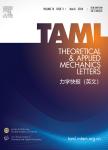Optimization of high-speed railway pantographs for improving pantograph-catenary contact
Optimization of high-speed railway pantographs for improving pantograph-catenary contact作者机构:IDMEC-IST Technical Univ. of Lisbon Av. Rovisco Pais
出 版 物:《Theoretical & Applied Mechanics Letters》 (力学快报(英文版))
年 卷 期:2013年第3卷第1期
页 面:51-57页
学科分类:082304[工学-载运工具运用工程] 08[工学] 080204[工学-车辆工程] 0802[工学-机械工程] 0814[工学-土木工程] 082301[工学-道路与铁道工程] 0823[工学-交通运输工程]
基 金:supported by the projects SMARTRACK funded by FCT with the contract PTDC/EMEPME/101419/2008 and PANTOTRAIN funded by the EC with the contract SC8-GA-2009-234015 led by UNIFE
主 题:high-speed railway pantograph
摘 要:A crucial system for the operation of high-speed trains is the pantograph catenary interface as it is the sole responsible to deliver electrical power to the train. Being the catenary a stationary system with a long lifespan it is also less likely to be redesigned and upgraded than the pantographs that fit the train vehicles. This letter proposes an optimization procedure for the improvement of the contact quality between the pantograph and the catenary solely based on the redesign of the pantograph head suspension characteristics. A pantograph model is defined and validated against experimental dynamic characteristics of existing pantographs. An optimization strategy based on the use of a global optimization method, to find the vicinity of the optimal solution, followed by the use of a deterministic optimization algorithm, to fine tune the optimal solution, is applied here. The spring stiffness, damping characteristics and bow mass are the design variables used for the pantograph optimization. The objective of the optimal problem is the minimization of the standard deviation of the contact force history, which is the most important quantity to define the contact quality. The pantograph head suspension characteristics are allowed to vary within technological realistic limits. It is found that current high-speed railway pantographs have a limited potential for mechanical improvements, not exceeding 10% 15% on the decrease of the standard deviation of the contact force. C 2013 The Chinese Society of Theoretical and Applied Mechanics. [doi:10.1063/2.1301306]



